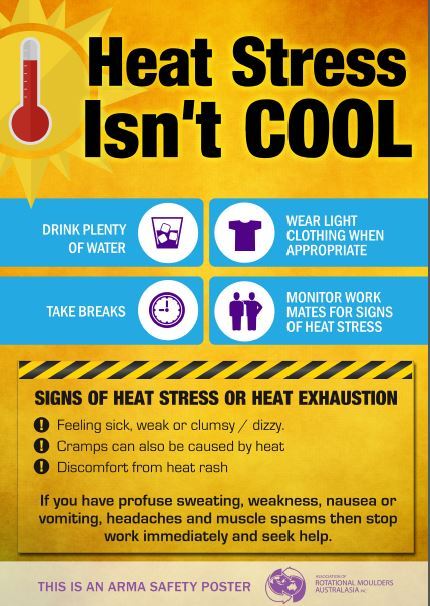How to Ensure Road Worker Safety This Summer
Working on the road exposes your team to hazards at the best of times, but in the summer there are added dangers.
By reading this article, you will be able to outline how to maximise your road workers' safety in the warmer months of the year. Find out how you can keep your employees safe this summer:
- Page Contents
- Sun Protection
- Heat Protection
- Control Traffic Outside of Work Zones
- Keep Crews Safe in Work Zones
- Make Sure Road Workers Always Wear the Correct PPE
- Ensure Road Workers are Fully Trained
- Maintain and Repair Your Equipment
Sun Protection
Your employees who work outdoors are at a greater risk of developing skin cancer. Although the sun is a great source of vitamin D, long-term exposure can cause skin damage and each episode of sunburn increases the risk of skin cancer.
As you are already aware, sunburn can prove to be an awful experience for the affected person. Your skin burns up and in more severe cases, can blister and become sore to touch. It can also make you feel itchy and appear to tighten your skin. Sweating and dehydration are also common side effects, too.
To ensure your road workers' safety, sun cream with an SPF factor of at least 15 should be used. Every two hours reapply the sun cream because it will wash off with the swear of carrying out their physical duties.
There is no legal obligation to say you must provide sun cream for your workers. However, The PPE at Work Regulation of 1992 notes that as an employer, you must provide your employees with suitable PPE. This means you need to take into account their work conditions and the weather when choosing the correct personal protective equipment.
Heat Protection
It often takes up to two or three weeks for employees to become acclimated to a hot environment. Here, you will need to allow time for your road workers' to adjust to the hot weather.
There are different ways that you can do this, including revising your work schedule. If possible, try and assign the harder, more physically challenging jobs to cooler days or during the cooler times of the day (outside of 1pm - 3pm).
Reduce workload and physical labour in warmer weather. Create a clear schedule for breaks and drinks.
There is a variety of conditions where the body is put under stress from overheating. This is called heat stress. Heat-related illnesses effect people in different ways. This can include heat cramps, exhaustion, heat rash and heat stroke. They all come with their own symptoms and treatments. The different symptoms can range from profuse sweating to dizziness and fainting.
Control Traffic Outside of Work Zones
Passing traffic is one of the biggest hazards for road workers, especially if they work on a motorway. You must have traffic protection in place if your team are exposed to traffic related danger.
• Identifies working areas e.g. position signs in the correct places to alert the public.
• Keeps the public out of work zones e.g. use barriers to make sure people stay out of working areas. They also control how much your site encroaches onto the road and allows you to set temporary speed limits in the area.
• Provides passing drivers, cyclists and pedestrians with clear directions about how to get through or around the work zone.
Keep Crews Safe in Work Zones
You can reduce risks for work zone accidents by:
- Separate your road workers' from moving equipment. For example, vehicles often enter and exit work sites. You need to make sure you have the correct signs that designates worker-only areas and safe pathways.
- Equipment operators should always check the workers on the ground before setting off. A 360-degree check before they move should suffice.
- Flaggers are often used on the road. Keep them safe by limiting their use and only use them if necessary. Ensure they have the correct training to identify and respond to hazards.
Make Sure Road Workers Always Wear the Correct PPE
Personal Protective Equipment is vital for your road workers' safety. Your workers should always wear these items on site.
- Hard hats.
- Safety boots.
- Hi-vis clothing.
- Eye and hearing protection.
- Ensure road workers have the correct training.
Traffic protection plans vary between jobs. You need to hold weekly or daily meetings with your team to outline the correct safety procedures for each job. This will reinforce the rules and make sure that everyone understands.
For workers who use equipment, it is important to keep manuals handy so that they are easy to consult when necessary.
Maintain and Repair Your Equipment
You need to maintain the equipment your workers use. This will make sure everyone is safe and will also boost your teams productivity and efficiency. You can be held responsible if an accident happens on site and the equipment is faulty.
Carry out regular inspections of the site and equipment. Any components that are damaged need repairing before being allowed onto the site. Also, log the repairs made to specific equipment. That way, should anything crop up, you have it on record.
Conclusion
There are a number of ways you can keep your team safe in the summer such as revising your work schedule. Ensure you provide your team with the correct PPE and make sure that they are always wearing their protective equipment while on site.
Having regular meetings that outline safety procedures will reinforce rules your workers may have forgotten. Also, control traffic on the site and designate worker-only areas. By reading this article, you now know how to effectively protect your workers in the warmer months.








